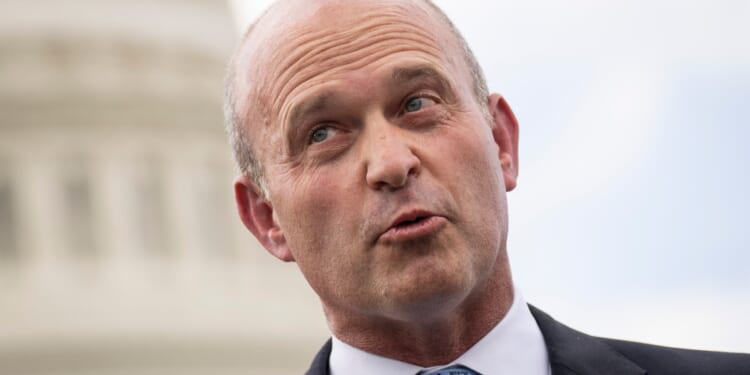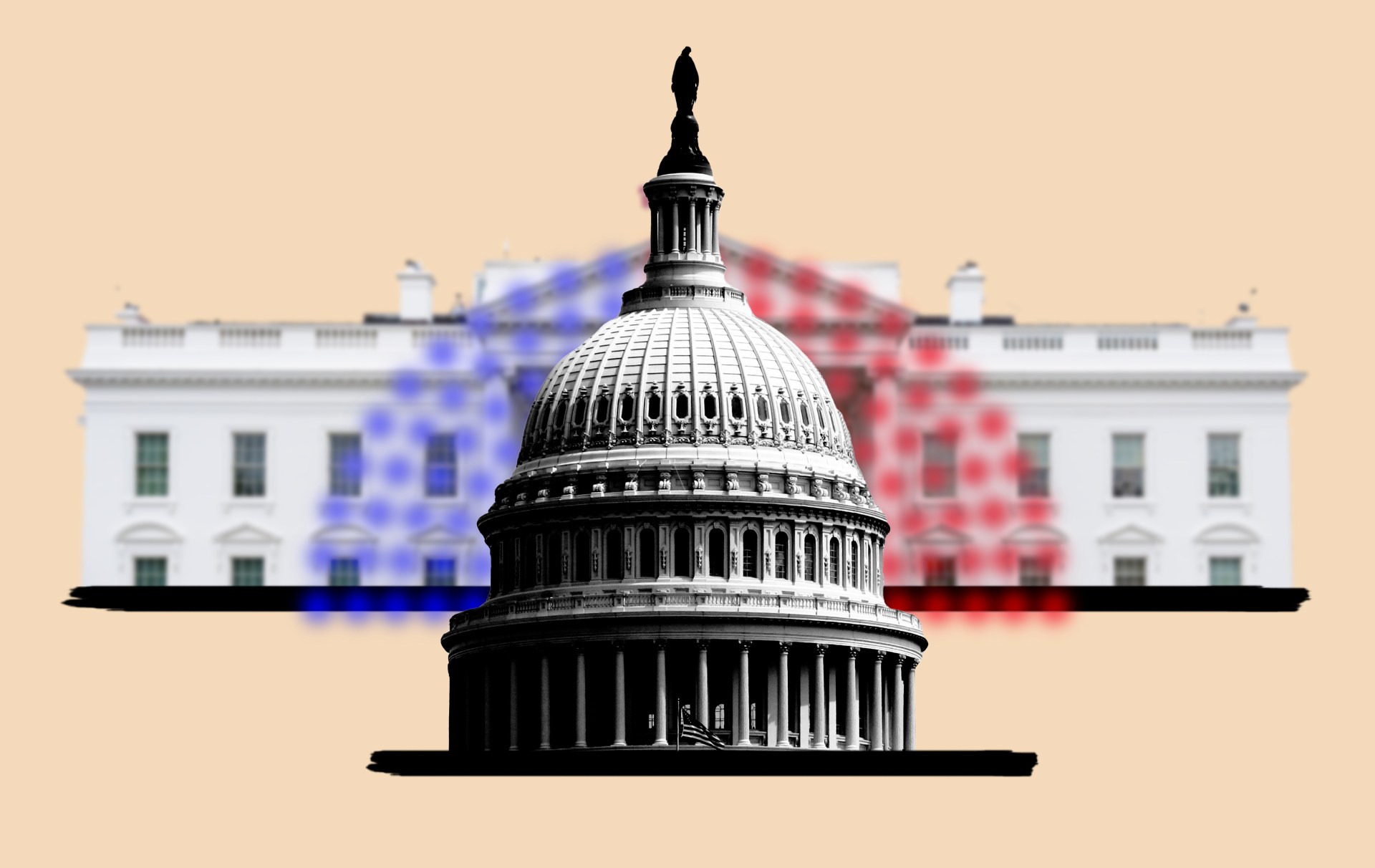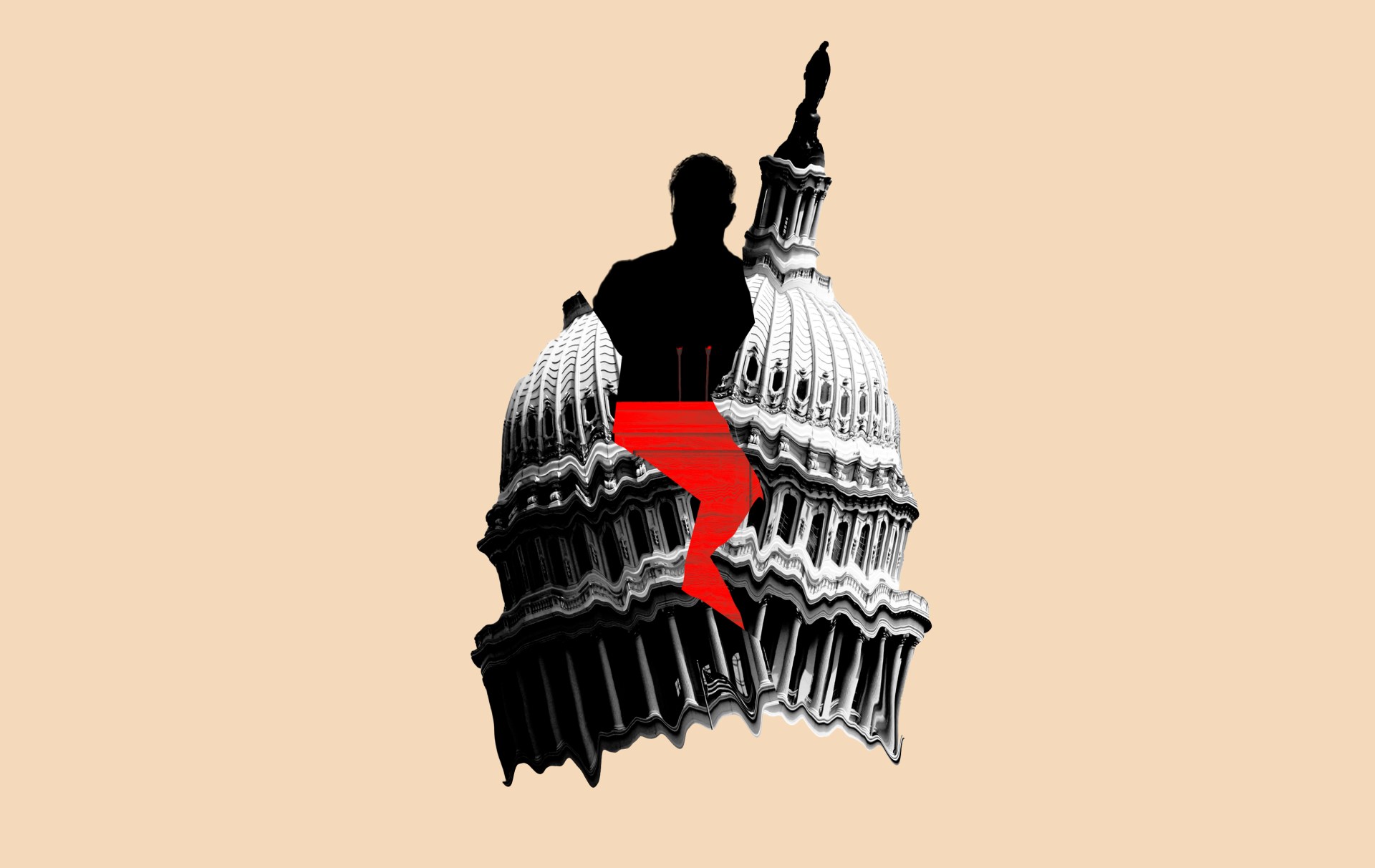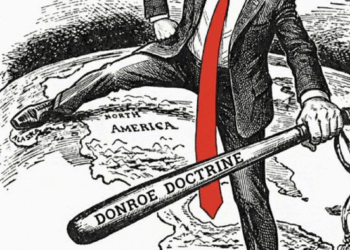Hello and happy Saturday. I remember that back in the early days of The Dispatch, we published more than a few articles about our political polarization and how Americans had divided themselves into two teams, each of which saw the other side not as friends and neighbors with different opinions but as outright enemies. These days it feels like we write more about the divisions within those two sides.
Progressives are always trying to pull the Democratic Party to the left, even though their positions on social issues are well outside the mainstream and their emphasis on identity politics is wearying to average Americans. More moderate Democrats, like newly elected Govs. Mikie Sherrill of New Jersey and Abigail Spanberger of Virginia, argue for more pragmatic policies and messaging.
The divisions on the right are, as evidenced by recent turmoil at the Heritage Foundation, a little more complicated. A brief recap: In late October, Tucker Carlson welcomed far-right white nationalist Nick Fuentes onto his show for a friendly conversation. Shortly afterward, Heritage President Kevin Roberts posted a video to social media defending Carlson’s platforming of Fuentes. (Carlson has no official affiliation with the conservative think tank but has spoken at Heritage events, and Heritage has advertised extensively on his shows.) The video sparked outrage from Heritage staffers, as Michael Warren and John McCormack reported on November 7. At an all-hands meeting two days before, one longtime Heritage scholar put it bluntly: “The issue here is Tucker Carlson. … Tucker’s show is like stepping into a lunatic asylum.”
The fight at Heritage illustrates the broader problem the right has with antisemitic, racist, reactionary elements within the movement. Donald Trump was aided in his rise to the top of the Republican Party by postliberals like Patrick Deneen and Michael Anton, who argue that classical liberalism has failed. In his Wednesday G-File (🔒), Jonah Goldberg offers a helpful primer on the various and sometimes overlapping segments of the right—the postliberals, nationalists, integralists—and argues that they also contributed to the rise of Fuentes and his “groyper” movement. Even if they don’t want to admit it.
Now, none of the serious people associated with any of these schools of thought would claim Fuentes as their own—certainly not publicly and, I would very much like to think, not privately either. …
The groypers are merely the latest iteration and online shock troops of the alt-right, which is not new either. It was the next generation of white nationalists, “paleocons,” and “neoreactionaries” associated with sites like VDARE, American Renaissance, the magazine Chronicles, the National Policy Institute, and figures like Curtis Yarvin, Richard Spencer, Paul Gottfried, and, after self-described Leninist Steve Bannon took it over, Breitbart, which Bannon sought to make the “platform for the alt right.” (In fairness to Breitbart, they’ve moved on from that. Oh, and Lenin was definitely a postliberal too.)
Not all of these people or others who were involved in these outlets necessarily share Fuentes’ views or are as proudly un- and anti-intellectual as he is. For instance, the late writer and consigliere to Pat Buchanan, Sam Francis, was a brilliant guy. He was also profoundly racist. But they all swam in the same waters and share a lot of intellectual and political DNA.
In a follow-up to his reporting with John McCormack, Michael Warren this week wrote about how Carlson has sought to influence Heritage over the years. He highlights a 2020 phone call Carlson made to the think tank, warning that he was going to go after Heritage president Kay Coles James for writing an op-ed about the George Floyd protests. On his show that night, he blasted her and encouraged his viewers not to donate to Heritage.
The story of Carlson’s stranglehold on an aging conservative think tank is part of a larger saga of how multiple institutions on the political right have suffered from an identity crisis in the age of Donald Trump. As the standard-bearer for the GOP, Trump brought to America’s conservative party a populist energy along with a darker approach to partisan politics. He had a clear disdain for the conservative movement and its institutions, and to the extent that he had interest in them it was to either co-opt them or to revel in their unraveling.
If Trump doesn’t care about the conservative movement, why, then, has Heritage sought to align itself so closely with him? Kevin Williamson doesn’t get it, either. He wrote in Wanderland (🔒):
Beyond the moral repugnance that necessarily attends being an apologist for apologists for neo-Nazis, Heritage’s recent organizational trajectory also has been idiotic from a merely calculating point of view: Heritage has always had a more activist character than organizations such as the American Enterprise Institute or Cato (and I should note here that I am affiliated with the Competitive Enterprise Institute), but the point of being an activist organization is to influence outcomes, to push a party, a coalition, or a faction in a particular policy direction. Heritage has taken the opposite approach: It simply takes its marching orders from Donald Trump and then backfills in whatever arguments or analysis are necessary—which is to say, it does not use activism to shape outcomes but uses propaganda to further someone else’s agenda.
Elsewhere, we had a very fun debate on a serious topic this week, as our own John McCormack explained why it would be bad for the Senate to blow up the filibuster and our friend and former colleague Andrew Egger argued that it should be abandoned because it no longer delivers good outcomes. Their pieces are highlighted below. Thanks for reading and have a good weekend.
There I was, minding my own business last week, when—ding—I received an alert in The Dispatch’s company Slack channel from a young colleague bearing bad news: Andrew Egger, our former Dispatch colleague—and my friend and almost-next-door neighbor—was wrong on the Internet. “Trump Is Right: The Filibuster Should Die,” read the headline of Egger’s very wrong column arguing in favor of scrapping the 60-vote hurdle for most legislation in the U.S. Senate. (In order to end the government shutdown with a GOP-only funding bill, Trump had been reiterating his long-held desire to kill the filibuster.) To make matters worse, the young Dispatch colleague who alerted me to the fact that Egger was wrong on the Internet did not even realize that Egger was wrong. In fact, my young colleague thought Egger was actually right and requested a debate on the subject, which is how two almost-next-door neighbors went from drinking martinis at my place last weekend to sparring in the online pages of The Dispatch today.
The filibuster isn’t an axiom of right-thinking political philosophy. It wasn’t handed down from on high on tablets of stone—or even baked semi-permanently into the American system by the Founding Fathers. It’s a piece of procedure, one that deserves to exist if it encourages and achieves good outcomes and that deserves to be questioned if it ceases to do so. And lately, it’s becoming harder to argue that the filibuster is accomplishing any of the positive outcomes with which its defenders credit it. Start with the most obvious: those supposed incentives for bipartisanship and compromise. Sniff around Washington: Do you detect a lot of either in the air? This week, Congress is in the process of winding down the longest government shutdown in American history. These ludicrous, enormously costly shutdowns, once nearly unthinkable, now loom over Congress pretty much at all times as the body limps from one short-term spending crisis to another, like a guy with two blown knees trying to compete in the 60-meter hurdles.
The president’s job approval dropped 3 full points in less than a month, roughly coinciding with public anxiety about SNAP benefits being cut off. Polling during the shutdown consistently showed that the public blamed Trump and his party more than the Democrats for the crisis, and one survey conducted last week found 16 percent of Trump voters now saying they regret having cast their ballot for him last year. When asked why, the most common responses featured the words “government” and/or “shutdown.” Today, the president has less, not more, political capital than he had before Democrats turned the lights off. If there was any doubt about that, last week’s election results erased it. Meanwhile, the Epstein crisis has gotten worse for him. The emails I wrote about yesterday turned out to be the first in a bigger batch released by House Democrats, in which America’s most notorious pedophile cast aspersions on America’s most notorious president. Epstein claimed to have photos of Trump “with girls in bikinis in my kitchen” and told one powerful friend, “i know how dirty donald is.” He called his former friend a “maniac” with “not one decent cell in his body” and said to another correspondent, “i am the one able to take him down.”
Through memes, but more explicitly in public statements and announcements, the agency is presenting DHS’s mission as being not just about securing the border or even finding and deporting “the worst of the worst,” but also preserving and reconstituting a certain view of American culture and identity. And this focus is part of the messaging in the agency’s large-scale recruiting effort to hire thousands of new people, including 10,000 additional ICE officers. DHS puts out weekly videos about its work, many of them presented by Micah Bock, its deputy assistant secretary for strategic communications. “Equally important as the task of securing our borders is the task of defending our culture and what it means to be an American,” Bock said in a video last month calling for applicants to join United States Citizenship and Immigration Services (USCIS). “We know what it means to be an American, everyone knows what an American is. And how we are seeking to empower each of you is to make the decisions that will determine what our country looks like for decades to come. You’ll block communists, terrorists, and globalists who dilute our culture and import their failed ideologies.”




















